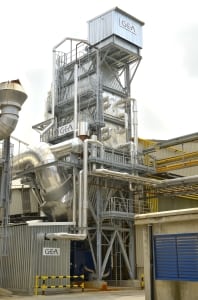GEA (Düsseldorf, Germany; www.gea.com) supplies Saint-Gobain with two Waste Heat Recovery Systems (WHRS) each for the utilization of waste heat from the float-glass production lines in Pisa, Italy and Sriperumbudur, India. Commissioning is planned for the first half of 2019. GEA technology makes it possible to generate electricity and compressed air from otherwise unused waste heat from the production process. Saint-Gobain can significantly improve energy efficiency in production and conserve resources with this GEA solution.
The existing gas-cleaning plant in Pisa will be integrated with the GEA WHRS. In Sriperumbudur the newly built gas cleaning plant supplied by GEA will also be equipped with the GEA WHRS. The reasons for going for a WHRS are different — in India the electric power supply for the plant will be insured, while for the Pisa plant the supply of compressed air was an important factor as well as the supply of thermal power for building heating. However what both plants have in common is the choice of GEA as a competent and reliable supplier by Saint-Gobain. One important reason being the technical know-how of GEA, having successfully commissioned a WHRS with thermal oil loop and electric power production via an organic Rankine cycle (ORC) in 2012 in the glass industry.
In a waste heat recovery system, thermal power is transferred from the waste gas to a heat carrier by heat exchangers (called waste heat recovery unit – WHRU). This heat carrier is, due to the temperatures, thermal oil. Via the heat carrier cycle the thermal power is transferred to an ORC. The ORC, similar to traditional steam cycles, generates electric power via a turbine and a generator. However instead of water, an organic medium is being used.
Furthermore, the turbine may be coupled with a compressor for producing compressed air, which will be the case for the Pisa plant as an innovative novelty. Both the generator as well as the compressor are installed on the turbine shaft. Thus, no further unnecessary efficiency losses are created for running the compressor
